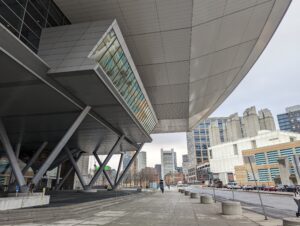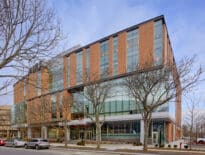
Record convention business in 2023 is filling one of the three major demand drivers in Boston’s hotel market, accounting for a projected 690,000 room-night reservations. Photo by James Sanna | Banker & Tradesman Staff
Seaport District sidewalks thronged with lanyard-draped businesspeople and comics cosplayers attest to a strong year for Boston’s convention center activity in 2023.
Massachusetts Convention Center Authority officials expect a record 790,000 attendees at nearly 200 events at their meeting halls in the Seaport and Back Bay, generating an estimated 690,000 room night reservations at local hotel properties.
“We’ve felt a robust bounceback,” MCCA Executive Director David Gibbons said. “Exhibitors have been struggling for two years, figuring out how to spend their marketing dollars, after some of the shows had gone virtual.”
The rebound of the convention center business fills a key demand driver in the local hotel market, following the recovery of the leisure travel segment in 2022.
The third leg of Boston’s hotel market, business travel, has yet to recover from COVID’s effects, including a partial shift to virtual meetings.
“Business travel has come back some, but in a different form than we have seen in the past,” said Derek Olsen, executive vice president at hotel consultants CMHWarnick. “The traditional business travelers are doing shorter trips, and it’s still got a ways to go.”
A recent report by business researchers Morning Consult indicated the downturn in business travel may be permanent. Nearly a third of survey respondents say their employers have changed travel policies such as cutting back the frequency of trips.
Business, group and convention and leisure travel traditionally each comprise about a third of the Boston area’s hotel business, according to industry researchers.
Market Set to Surpass Milestone
The Boston convention segment’s recovery includes repeat industry association meetings such as the Yankee Dental Congress, which brought 28,000 visitors to the Boston Convention and Exhibition Center in January. The gaming industry Penny Arcade Exposition, commonly known as PAX East, delivered 42,000 visitors to the year’s biggest gathering in March.
While industry associations historically generate nearly 70 percent of MCCA bookings, Gibbons also points to trade shows sponsored by corporations with a major presence in the BCEC’s backyard. Software companies PTC and Red Hat both sponsored events at the convention hall this month.
This year’s strong performance isn’t tied directly to pent-up demand from canceled shows during the pandemic, Gibbons noted. Most events are booked by organizers seven years in advance for the BCEC and four years ahead at the Hynes Convention Center in Back Bay.
“They often are regular accounts that rotate twice a decade through Boston, so we may have missed one rotation,” he said.
Boston-Cambridge’s hotel industry approached a major milestone in the first quarter as reflected in a key industry metric. Revenues per available room (RevPAR) in Boston and Cambridge hit 96 percent of 2019 levels, the benchmark for pre-pandemic financial performance, Braintree-based Pinnacle Advisory Group reported.
That’s significant, Pinnacle Principal Rachel Roginsky said, because Boston was among the hardest-hit hotel markets during the pandemic because of business travel cutbacks.
“Everyone is looking forward to where we are going, and how are we going to continue to get more corporate demand,” Pinnacle Principal Rachel Roginsky said. “And rates are going to increase.”
An anticipated wave of hotel-to-housing conversions failed to materialize, although Boston officials recently approved a supportive living conversion at the Dorchester Comfort Inn.
Operators Shielded from New Competition
Despite the improving market conditions, operators of existing properties can expect to benefit from a lull in new competition.
Rising interest rates and construction costs make loans for new hotel development challenging, industry sources predict, despite approved plans for new hotels in South Boston, the North End and Downtown Crossing.

Steve Adams
“There is construction financing out there, but it needs to be the right project, but it needs to be the right project and sponsor, and probably requires more equity,” said Alan Suzuki, managing director of capital markets for JLL Boston.
Lenders are seeking up to 50 percent equity from developers for construction loans, up from 40 percent prior to interest rate hikes, Suzuki said.
The interest rate environment also is depressing the investment sales market, with buyers and sellers at a lingering standoff over pricing.
Most of the sales activity has been concentrated in smaller resort and select-service properties owned by local and regional operators, Suzuki said.
“The price of debt for bigger deals is just more challenging to obtain,” Suzuki said. “There continues to be a bid-ask spread between buyers and sellers.”
Email: sadams@thewarrengroup.com





